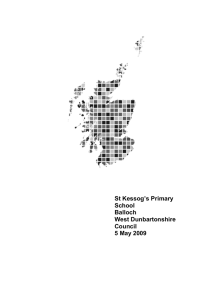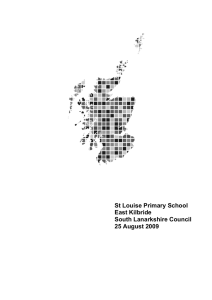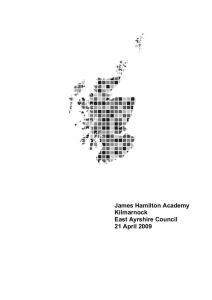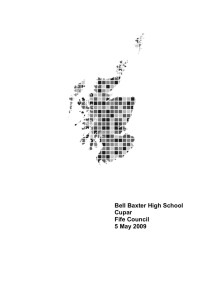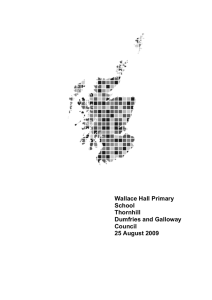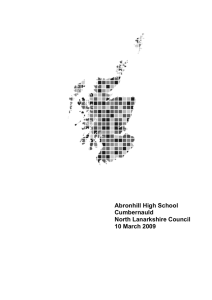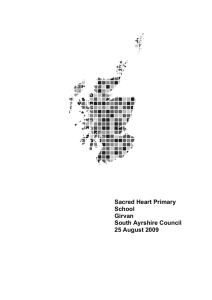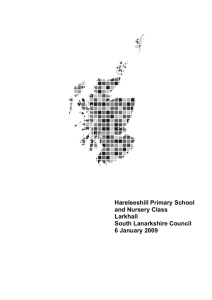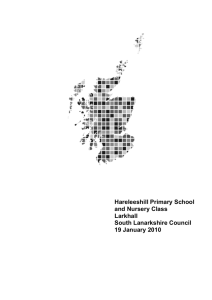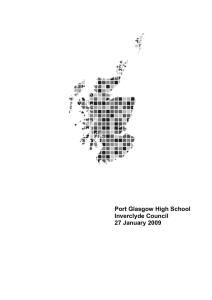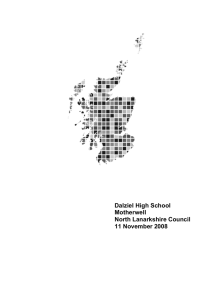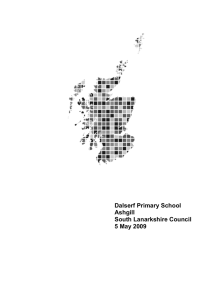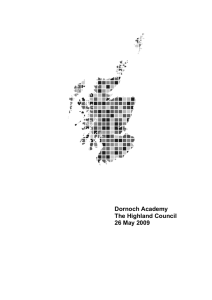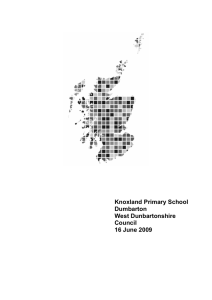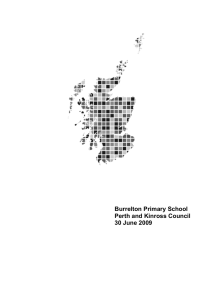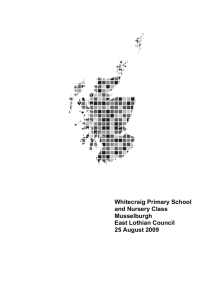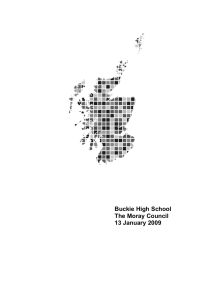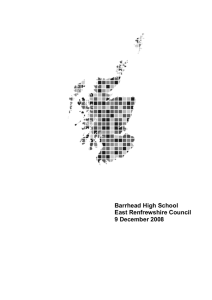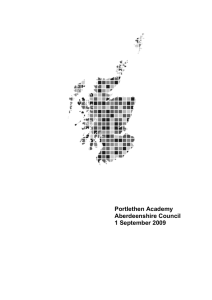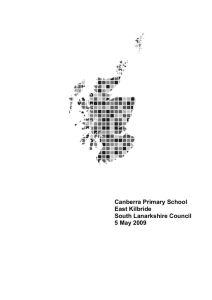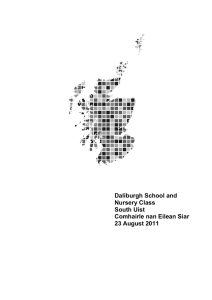Airidhantuim Primary School Isle of Lewis
advertisement
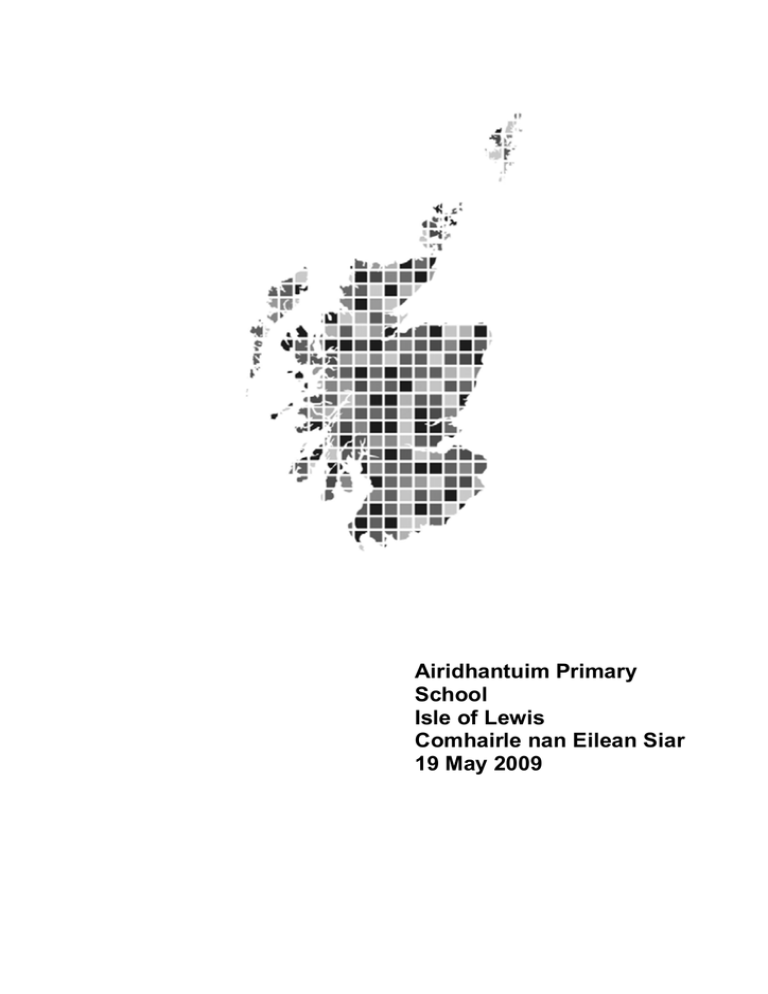
Airidhantuim Primary School Isle of Lewis Comhairle nan Eilean Siar 19 May 2009 This report tells you about the quality of education at the school1. We describe how children benefit from learning there. We explain how well they are doing and how good the school is at helping them to learn. Then we look at the ways in which the school does this. We describe how well the school works with other groups in the community, including parents2 and services which support children. We also comment on how well staff and children work together and how they go about improving the school. Our report describes the ‘ethos’ of the school. By ‘ethos’ we mean the relationships in the school, how well children are cared for and treated and how much is expected of them in all aspects of school life. Finally, we comment on the school’s aims. In particular, we focus on how well the aims help staff to deliver high quality learning, and the impact of leadership on the school’s success in achieving these aims. If you would like to learn more about our inspection of the school, please visit www.hmie.gov.uk. Here you can find analyses of questionnaire returns. Where applicable, you will also be able to find descriptions of good practice in the school. 1 2 The term ‘school’ is used to include the work of the nursery class, where relevant. Throughout this report, the term ‘parents’ should be taken to include foster carers, residential care staff and carers who are relatives or friends. Contents 1. The school 2. Particular strengths of the school 3. Examples of good practice 4. How well do children learn and achieve? 5. How well do staff work with others to support children’s learning? 6. Are staff and children actively involved in improving their school community? 7. Does the school have high expectations of all children? 8. Does the school have a clear sense of direction? 9. What happens next? 1. The school Airidhantuim Primary School is a non-denominational school. It serves the villages of Ballantrushal, Shader, Borve and Galson on the Isle of Lewis. The roll was 29, including 18 in the Gaelic-medium classes, when the inspection was carried out in March 2009. Pupils’ attendance was in line with the national average in 2007/2008. The headteacher also has responsibility for managing Barvas Primary School as part of the Council’s shared leadership of schools initiative. Evaluations in this report, except where otherwise indicated, apply equally to the Gaelic-medium and English-medium classes. 1 2. Particular strengths of the school • Leadership of the headteacher and the commitment of all staff to improving the work of the school. • The quality of learners’ experience in Gaelic. • Well-behaved children who are motivated to learn. • The quality of children’s active involvement in their learning. • Strong and supportive partnerships with parents and the community. 3. Examples of good practice • Development of Gaelic learning across the school. • Children’s learning through real-life situations in mathematics in the upper stages. 4. How well do children learn and achieve? Learning and achievement Children achieve well in a wide variety of activities. They are enthusiastic and proud of their achievements. At all stages, children are developing effectively enterprise skills and have recently achieved a gold award for enterprise activities. They organised a fundraising 2 day for a global charity which was attended by members of the school community, the local playgroup, senior citizens and business partners. As part of their whole-school topic on Lewis, children are working with parents to produce a DVD for tourists. Children participate in a range of out-of-school sports activities such as football, uni-hoc and basketball. The school drama group achieved recognition in the national and local Mod. Staff use children’s interests well to develop children’s skills in environmental studies. For example, children used the Internet to research the history of Lewis and made posters to advertise areas of interest. Children at P7 show responsibility in their work as buddies to P1 and as paired reading partners. Over the last few years, the school has maintained high standards of attainment in reading, writing and mathematics. Across the school, most children are making very good progress in listening, talking, reading, and mathematics. Their progress in writing is good and the school is taking very effective steps to improve it further. Children read with fluency and expression. Almost all children take care with the presentation of their work. In writing, children write for a variety of contexts and should now have further opportunities to write at length. At the early stages, children are making a very good start to developing their mathematical skills. Across the school, children take part enthusiastically in mental mathematics. At the upper stages, they are very skilled at solving mathematical problems through real-life situations. Children with additional support needs are making good progress towards their learning targets in individualised educational programmes. Children are developing a very good understanding of healthy eating and healthy lifestyles and the school has recently gained a gold award for health promotion. Gaelic-medium In the Gaelic-medium classes, most children are making very good progress in reading, listening and talking. Children’s literacy skills are being developed well across a number of curriculum areas. They listen very well to adults and each other and are confident in talking in groups. Children write well for a range of purposes, including play scripts, which they perform confidently to a range of audiences. 3 Curriculum and meeting learning needs Across the school, staff provide children with an appropriately broad curriculum. Staff are developing well aspects of the national initiative, Curriculum for Excellence. They are effective in planning learning which uses real life situations and makes links with other areas of learning. For example, the whole-school topic on Lewis involves children in learning from the local community. Children are working with the local councillor and have visited the council offices to discover how the council works. They benefit from working with the Youth Music Initiative to develop skills on the keyboard and guitar. Staff use interactive whiteboards and computers to make learning more interesting. Their personal, social and citizenship skills are also developing very well. The school’s commitment to making children aware of global issues is a strength of the school. Tolerance and respect for other cultures and faiths is promoted effectively in class and at school assemblies. The learning needs of most children are well met. Across the stages, tasks, activities and resources are largely well matched to most children’s needs. At times, the rate of learning is slow and some tasks need to be more challenging for a few children. Most children are confident in describing how they can improve their work. Staff give clear explanations and share the purpose of lessons with children. They are skilled at questioning and review what has been learned at the end of lessons. They know children well and work effectively as a team to ensure that all children’s learning needs are well supported. Support staff work closely with teachers and provide well-judged help to individuals and small groups of children. Support plans for children with additional support needs are clear, with appropriate short-and long-term learning targets to help them make progress. Staff work closely and effectively with partner agencies to secure good support for children who need it. At all stages, teachers set regular homework which is at the right level for children. 4 5. How well do staff work with others to support children’s learning? Teachers have developed good working partnerships with parents. They keep parents up-to-date about their children’s progress through meetings, newsletters and helpful written reports. All parents feel that they are well informed about their children’s progress. Staff have close and effective links with a number of local organisations, including psychological services, social workers and local businesses. These partnerships are successful in supporting children in their learning and wider achievements. The school has appropriate procedures in place to deal with complaints if they arise. Children are supported very well to make a confident and successful move from nursery to primary and from P7 to Lionel School. 6. Are staff and children actively involved in improving their school community? Children are successful in taking on a wide range of responsibilities. At all stages, they play an active part in the pupil council. This helps to take forward new developments in the school. They have been successful in making improvements to the school grounds, playground games, and added to their wet play games. Children have learned how to care for the environment and understand the importance of recycling materials and saving energy. The school has succeeded in gaining an Eco-Schools Scotland award at bronze level. They have developed strong links with the local countryside ranger. Staff work very well together to improve the school. The headteacher uses a range of ways to identify the school’s strengths and weaknesses. She checks teacher’s plans, observes lessons and gives helpful feedback to teachers. This thorough approach is having a positive impact on maintaining high standards. Further improvements in tracking children’s progress would help to ensure that all children’s learning needs are met even more effectively. As members of school working groups, teachers contribute enthusiastically and well to improving teaching and learning. Staff work closely with the supportive Parent 5 Council to improve the performance of the school. When making improvements, staff carefully consider the views of all children and parents. 7. Does the school have high expectations of all children? Staff value all children and take very good care of them. They work very well together. Children are polite and well behaved. They are listened to and feel safe and well cared for in the school. They are eager learners in a school which promotes involvement of all children, whatever their needs. There are very good links with the local churches who support the school in religious observance at assemblies. A few children and parents would like more after-school clubs. All teachers and support staff are confident in their knowledge of child protection procedures. Staff encourage children to work hard, for example, by allowing them to choose activities as rewards. Children’s achievements are rewarded through a range of certificates at the weekly assembly. Staff could have higher expectations of a few higher-attaining pupils. There are good procedures in place to check and encourage children’s attendance at school. 8. Does the school have a clear sense of direction? The school has a very clear sense of direction. The headteacher has been very successful in developing teamwork and shared developments between the two schools for which she has leadership responsibility. She works successfully to promote the school, and Gaelic medium education, in the local community. The highly-motivated staff work effectively as a team. They provide very good quality learning experiences in both English language and Gaelic. Teachers have opportunities to take the lead in important developments. As a result of the strong leadership and the quality of teaching and learning, the school has a very strong ability to continue to improve. 6 9. What happens next? As a result of the very good quality of education provided by the school, we will make no further visits following this inspection. The education authority will inform parents about the school’s progress as part of the authority’s arrangements for reporting to parents on the quality of its schools. We have agreed the following area for improvement with the school and education authority. • Improve further the school’s approach to tracking children’s progress. • Ensure that tasks are set at an appropriate level of challenge so that children are encouraged to fulfil and build their potential. 7 Quality indicators help schools and nursery classes, education authorities and inspectors to judge what is good and what needs to be improved in the work of a school and a nursery class. You can find these quality indicators in the HMIE publications How good is our school? and The Child at the Centre. Following the inspection of each school, the Scottish Government gathers evaluations of three important quality indicators to keep track of how well all Scottish schools and nursery classes are doing. Here are the evaluations for Airidhantuim Primary School. Improvements in performance Learners’ experiences Meeting learning needs very good very good good We also evaluated the following aspects of the work of the school. The curriculum Improvement through self-evaluation HM Inspector: Sadie Cushley 19 May 2009 8 very good very good To find out more about inspections or get an electronic copy of this report go to www.hmie.gov.uk. Please contact the Business Management and Communications Team (BMCT) if you wish to enquire about our arrangements for translated or other appropriate versions. If you wish to comment about any of our inspections, contact us at HMIEenquiries@hmie.gsi.gov.uk or alternatively you should write in the first instance to BMCT, HM Inspectorate of Education, Denholm House, Almondvale Business Park, Almondvale Way, Livingston EH54 6GA. Our complaints procedure is available from our website www.hmie.gov.uk or alternatively you can write to our Complaints Manager, at the address above or by telephoning 01506 600259. If you are not satisfied with the action we have taken at the end of our complaints procedure, you can raise your complaint with the Scottish Public Services Ombudsman (SPSO). The SPSO is fully independent and has powers to investigate complaints about Government departments and agencies. You should write to SPSO, Freepost EH641, Edinburgh EH3 0BR. You can also telephone 0800 377 7330, fax 0800 377 7331 or e-mail: ask@spso.org.uk. More information about the Ombudsman’s office can be obtained from the website at www.spso.org.uk. This report uses the following word scale to make clear judgements made by inspectors. excellent very good good satisfactory weak unsatisfactory outstanding, sector leading major strengths important strengths with some areas for improvement strengths just outweigh weaknesses important weaknesses major weaknesses Crown Copyright 2009 HM Inspectorate of Education
